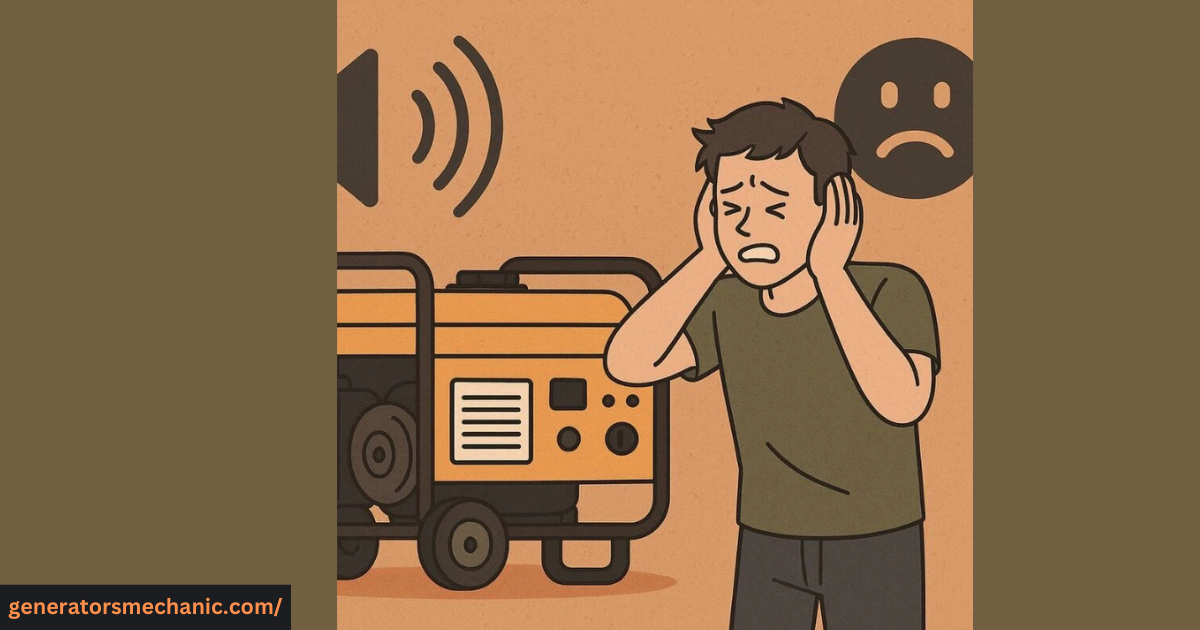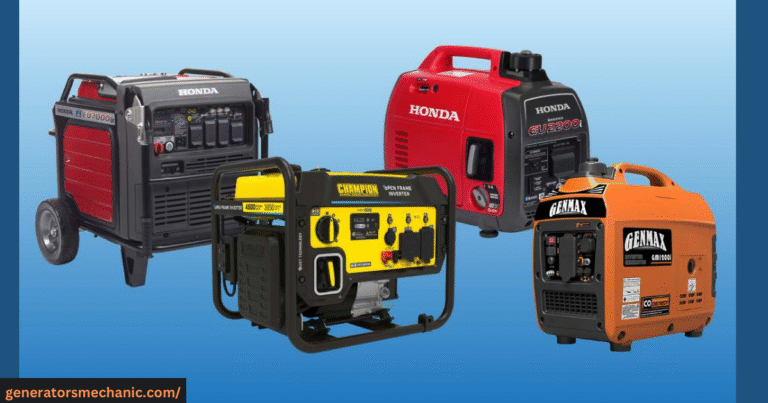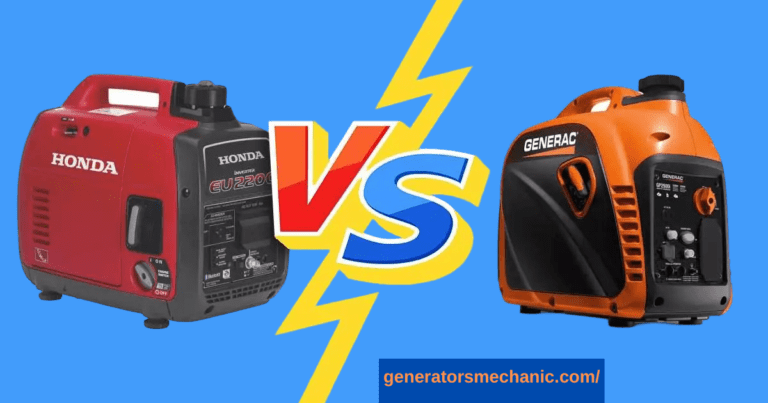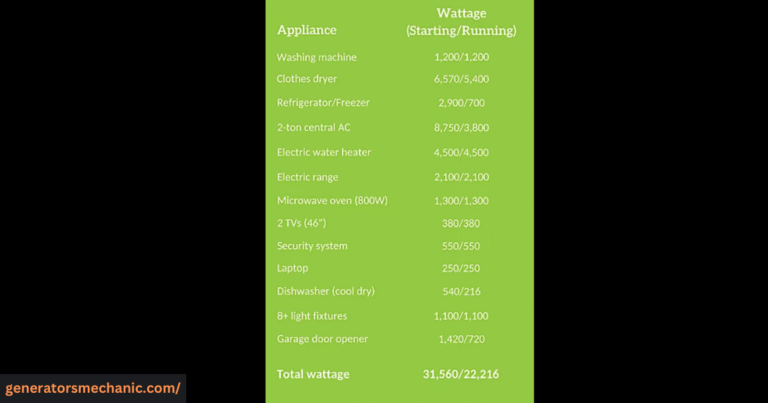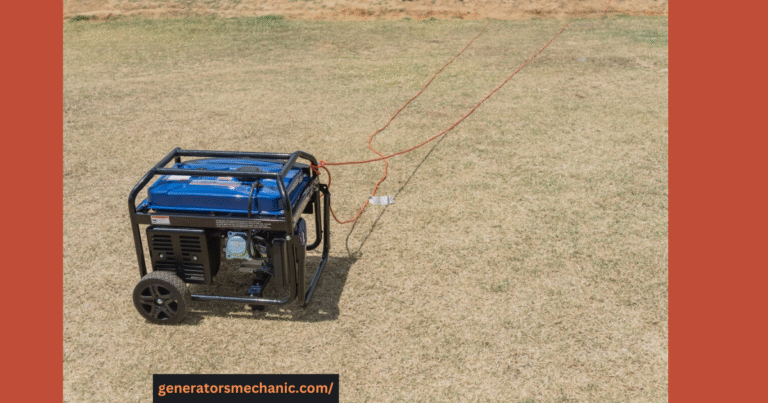How Loud Are Generators really? (dB Chart + Noise Comparison)
When people ask, “How loud are generators really?” the answer often depends on the type and size of the generator. For example, a small inverter generator can be as quiet as a normal conversation, while a large industrial unit may sound as loud as heavy street traffic. In most cases, portable models usually fall in the 60–75 dB range, which is noticeable but still manageable for short-term use.
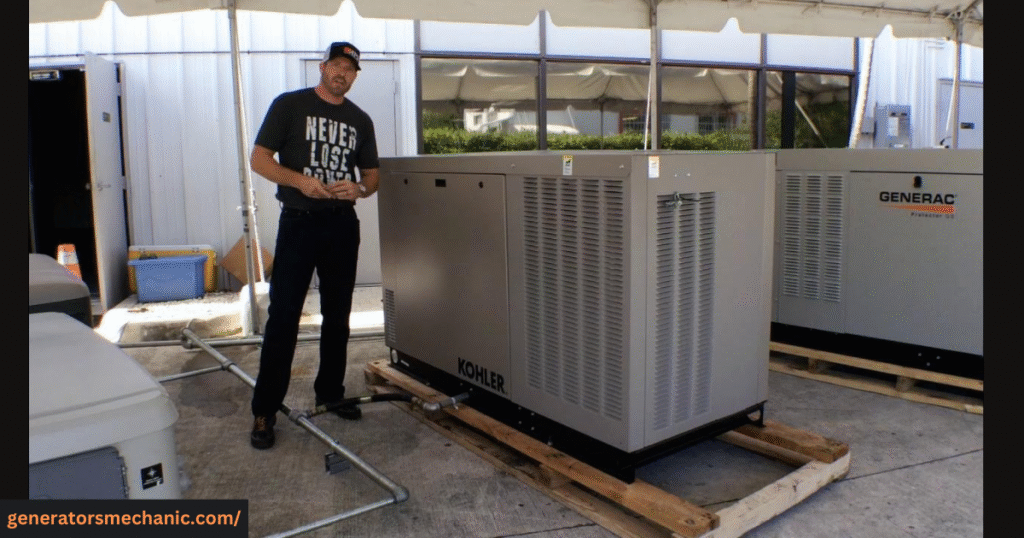
Interestingly, online discussions like “How loud are generators really Reddit” threads often show that users experience different results depending on placement and environment. A generator in an open backyard may feel much quieter than the same unit running near walls or in a garage where sound echoes. This is why understanding noise levels in decibels (dB) and comparing them to everyday sounds is the best way to get a real idea of what to expect.
In simple terms, generators aren’t always “too loud,” but the noise level can become an issue if you’re in a quiet neighborhood or plan to run them overnight. Choosing the right type of generator and installing it correctly can make a huge difference in how loud it actually feels.
Generators are lifesavers during power outages, camping trips, and even in construction projects. But there’s always one big concern: noise. If you’ve ever asked yourself, “How loud are generators really?”, the answer depends on the type of generator, where it’s placed, and how it’s built. We’ll explain the process stepwise to ensure you understand what to expect.
Why Generator Noise Matters
Generator noise isn’t just an annoying background hum—it can actually have a big impact on your daily life. A loud generator running for hours may disturb your family’s sleep, bother neighbors, and even create stress for pets who are sensitive to sound. In fact, many people don’t realize that prolonged exposure to high noise levels can affect mood and concentration.

Another reason generator noise matters is because of local noise regulations. Some neighborhoods or communities set strict limits on how loud outdoor equipment can be. If your generator crosses those limits, you could face complaints or even penalties. That’s why it’s important to understand the actual loudness of different models. A simple generator noise level chart can help you compare decibels across portable, standby, and industrial units, making it easier to choose one that fits both your power needs and your environment.
At the end of the day, the quieter the generator, the more comfortable and stress-free your surroundings will be—especially during long power outages when the machine needs to run for hours.
Generators may be powerful, but their noise can sometimes feel like a trade-off.
Impact on Daily Life
Imagine trying to sleep while your generator hums outside your window. A noisy generator can disturb family members, neighbors, and even pets. If you live in a quiet neighborhood, this becomes an even bigger issue.
Legal and Environmental Concerns
In some cities, there are noise level regulations that limit how loud machinery can be. Plus, excessive noise contributes to environmental noise pollution, something more communities are taking seriously.
How Generator Noise is Measured
When people talk about how loud a generator is, they usually refer to its decibel (dB) rating. Decibels are a unit of measurement used to determine sound intensity. The higher the dB rating, the louder the generator will feel to your ears. For context, normal conversation is around 60 dB, while a lawn mower can reach 90 dB. Generators typically fall somewhere in between, depending on their size and type.
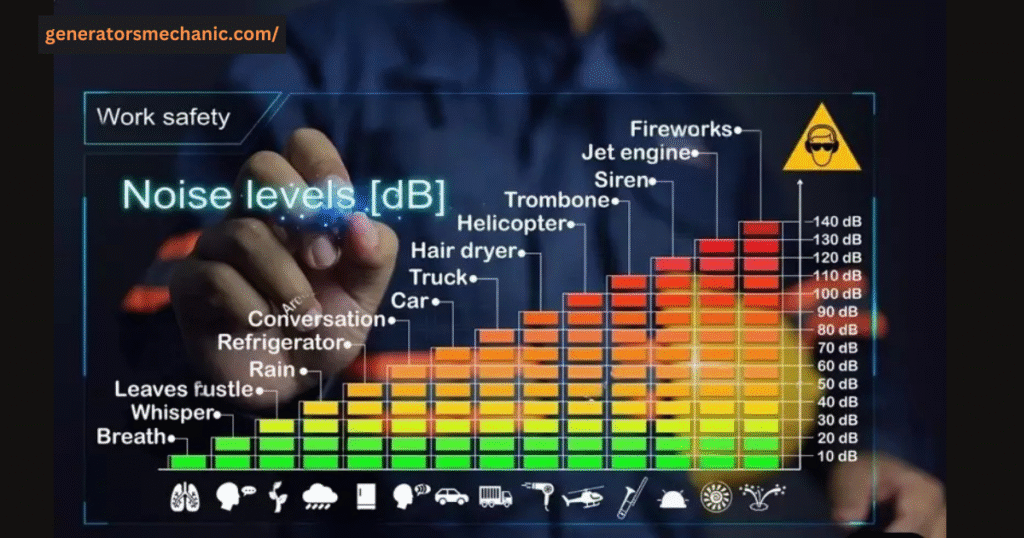
To measure generator noise, manufacturers test them at a specific distance—usually 7 meters (about 23 feet) away. This provides a standard baseline for comparison. For example, a portable generator rated at 70 dB means it will sound like a vacuum cleaner when measured at that distance. Closer placement will naturally feel louder, while placing it farther away will reduce the perceived noise.
Another important factor to consider is generator noise level regulations. In many residential areas, local authorities set limits on acceptable noise levels, especially during nighttime hours. Exceeding these limits can cause complaints from neighbors and even fines in stricter regions. That’s why understanding how generator noise is measured is not just a technical detail—it’s also about staying compliant with regulations and maintaining peace in your community.
To understand generator loudness, you need to know how it’s measured.
What Are Decibels (dB)?
Noise is measured in decibels (dB). For context:
- A normal conversation = about 60 dB
- A vacuum cleaner = about 70 dB
- Heavy traffic = 80–85 dB
So, when we say a generator runs at 70 dB, it’s about as loud as a vacuum cleaner running nearby.
Average Noise Levels of Different Generators
- Portable generators often range from 60–75 dB
- Standby home generators usually fall between 55–70 dB
- Large industrial units can go over 80 dB
Factors That Affect Generator Loudness
Not all generators produce the same level of noise, and several factors influence just how loud they can be. The first major factor is size and power output. Larger engines designed to produce more electricity often generate more sound because they burn more fuel and work at higher RPMs. In contrast, smaller inverter generators are typically quieter due to their advanced technology and efficient design.

Another factor is engine type and design. Traditional open-frame generators allow more sound to escape, while modern enclosed or inverter models come with built-in sound insulation. Placement also plays a huge role—installing a generator near walls or inside a garage without ventilation can amplify echoes and make it seem much louder than it actually is.
To give you perspective, people often ask, “How loud is a 68 decibel generator?” In reality, 68 dB is about the same as normal conversation or running a dishwasher. While noticeable, it’s far from unbearable, especially if placed a reasonable distance away. With proper maintenance and smart positioning, even louder generators can feel quieter in everyday use.
Not all generators are created equal. Here’s what influences their noise level:
Size and Power Output
The bigger the generator, the louder it usually is. More power requires a larger engine, which naturally makes more noise.
Engine Type and Design
Modern inverter generators are designed with noise reduction in mind. Meanwhile, traditional open-frame generators are louder due to less insulation.
Placement and Surroundings
Put a generator near walls or in a closed space, and sound may echo. On the other hand, proper outdoor placement can reduce perceived noise.
Comparing Generator Noise Levels in Real Life
When people hear the word generator, most of them immediately think of the loud rumbling noise that comes with it. But in reality, not all generators are equally loud. Their sound levels vary depending on size, design, and purpose. For example, a small inverter generator can be as quiet as a normal conversation, while a large industrial unit can roar as loudly as busy city traffic.
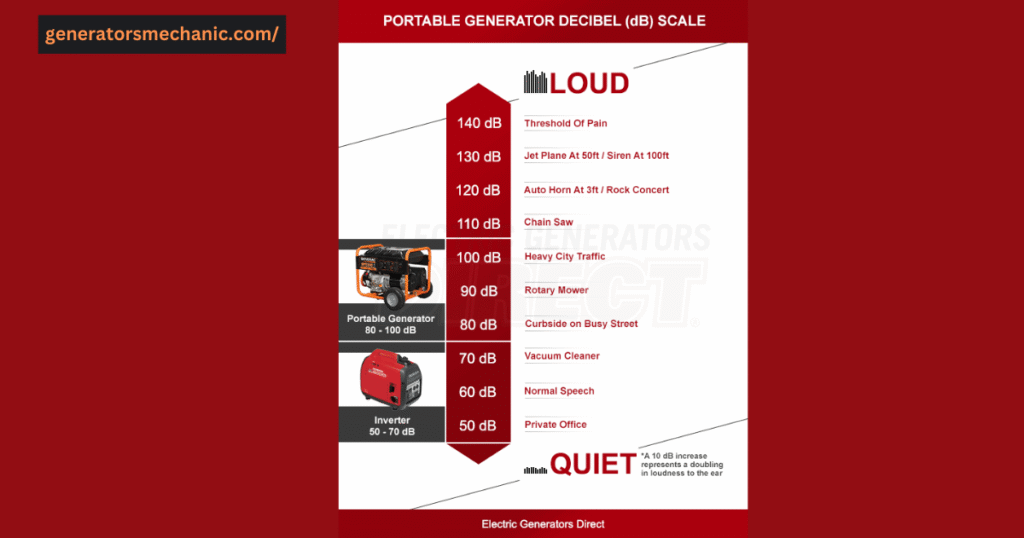
To make these numbers meaningful, noise levels are usually measured in decibels (dB). A generator running at 60–70 dB sounds about the same as a dishwasher or vacuum cleaner. On the other hand, an industrial generator can easily cross 80 dB, which is similar to standing near a power drill or heavy street traffic. This comparison helps you decide which type of generator is practical for your home, outdoor activities, or workplace.
If you’re curious about how loud your own generator is, you don’t always need professional equipment. These days, you can even use a dB sound generator app on your smartphone to measure approximate noise levels. While not as precise as specialized tools, these apps give you a good idea of whether your generator is within acceptable sound limits. This way, you can compare real-life noise levels to common sounds and see if your generator is too loud for daily use.
Generator Noise Level Comparison Chart
| Generator Type | Average Noise Level (dB) | Comparable Everyday Sound |
| Inverter Generator | 50 – 60 dB | Quiet conversation, office chatter |
| Portable Generator | 60 – 75 dB | Normal conversation, dishwasher |
| Standby Home Generator | 55 – 70 dB | Background music, distant traffic |
| Industrial Generator | 80+ dB | Busy street traffic, power drill |
Let’s compare generator types to real-world sounds so you can picture the difference:
Portable Generators (60–75 dB)
These are common for camping or small backup needs. Their noise is similar to a normal conversation or a dishwasher running.
Standby Home Generators (55–70 dB)
These are permanently installed units, often quieter than portables. They can sound like light background music or distant traffic.
Industrial Generators (80+ dB)
These are workhorses, but they’re loud—comparable to busy street traffic or a power drill. Ear protection is often recommended when standing nearby.
Tips to Reduce Generator Noise
Nobody likes a generator that sounds like a roaring machine, especially if you’re using it near your home or while camping. The good news is that you don’t always need to put up with high noise levels. With the right strategies, you can make your generator run much quieter and more comfortably for everyone around.
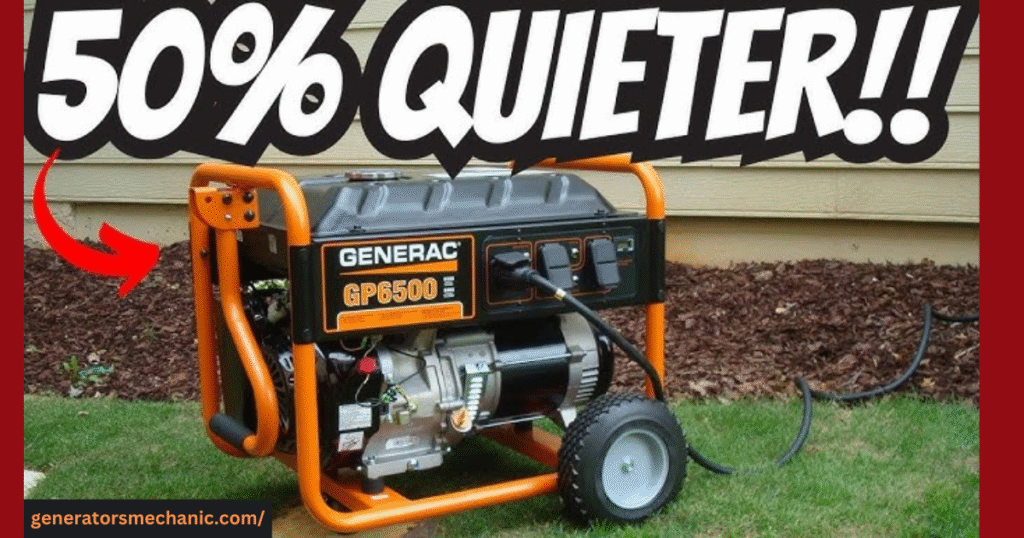
One of the easiest ways to reduce noise is by using generator enclosures or sound barriers. These are designed to absorb and block sound waves, bringing down the overall decibel generator reading significantly. Even a simple DIY soundproof box can cut a lot of the noise.
Placement also matters a lot. If you place your generator far away from living spaces or direct the exhaust pipe away from your home, you’ll notice a big difference in how loud it feels. Surroundings like walls, fences, or even natural barriers such as bushes can also help reduce the echo.
Lastly, never ignore maintenance. A well-serviced engine runs smoother and quieter. Adding an upgraded muffler or using rubber pads under the generator can further dampen vibrations and noise. Small steps like these can make your generator operate at a tolerable noise level without compromising on performance.
Good news: you can lower the noise if you follow a few steps.
Use of Sound Barriers or Enclosures
Special soundproof boxes or barriers can cut down the noise significantly.
Proper Placement
Always place the generator as far away from living areas as possible. A few extra meters can make a big difference.
Maintenance and Mufflers
Well-maintained engines run smoother and quieter. Some generators also support aftermarket mufflers for additional noise reduction.
Quiet Generator Options
If noise is your main concern, then choosing a quiet generator is the smartest move. Traditional open-frame models may provide plenty of power, but they often produce noise levels that can disturb you and your neighbors. This is why many people are turning toward inverter generators and modern, eco-friendly models. These options are designed with advanced technology that lowers both engine noise and vibration, often keeping the sound range between 50–60 dB—about as quiet as a normal conversation.
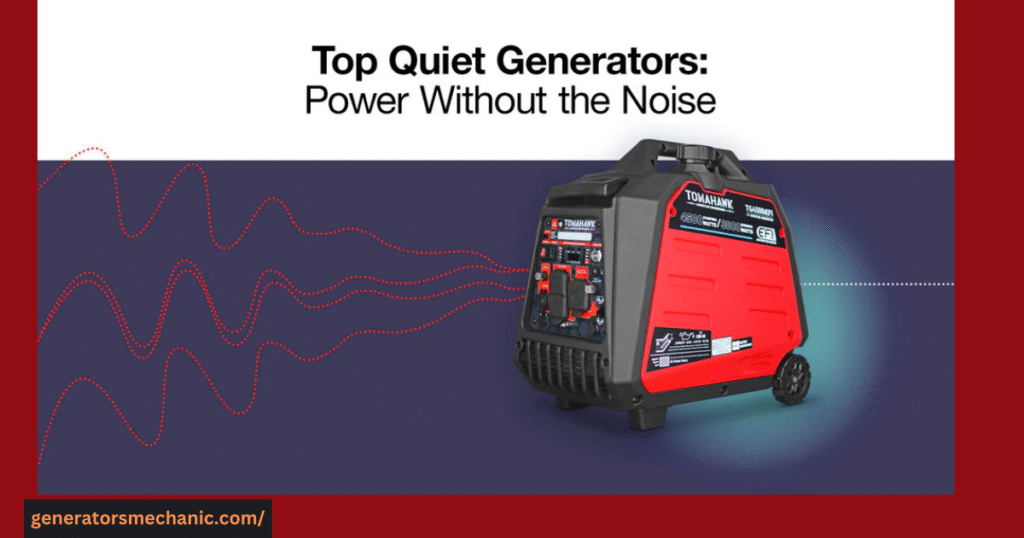
To put this into perspective, you might wonder: how loud is 67 decibels for a generator? Well, 67 dB is roughly the same as background office noise or a running dishwasher. It’s noticeable, but not overwhelming, which makes quiet generators a great fit for residential areas, camping trips, or RV use.
Many newer models also include features like automatic load adjustment, better mufflers, and sound-dampening enclosures. This means you don’t have to sacrifice peace of mind just to have reliable backup power.
If noise is your top concern, these might be the right choice:
Inverter Generators
They’re lightweight, fuel-efficient, and much quieter—often between 50–60 dB, which is as soft as a quiet conversation.
Hybrid and Modern Eco-Friendly Models
Many new models are designed with noise reduction features, giving you power without disturbing peace.
Final Thoughts – Are Generators Too Loud for You?
So, how loud are generators really? The answer ranges from a soft hum to a full-on roar, depending on the type, size, and setup. For most households, a modern inverter or standby generator is quiet enough to blend into the background. But if you’re using a big industrial unit, expect some serious noise.
At the end of the day, the right generator is the one that balances power, efficiency, and acceptable noise levels for your needs.
🔹 FAQs
How many decibels is a typical generator?
Most portable generators range between 60–75 dB, standby generators run around 55–70 dB, while industrial units can exceed 80 dB.
What is the quietest type of generator?
Inverter generators are the quietest, often producing only 50–60 dB, which is about as loud as a normal conversation.
Is 70 dB loud for a generator?
70 dB is similar to the sound of a vacuum cleaner. It’s noticeable but not extremely loud, and proper placement can make it less disturbing.
How can I make my generator quieter?
You can reduce noise by using soundproof enclosures, adding mufflers, placing the generator farther away, and keeping it well-maintained.
Are standby generators quieter than portable ones?
Yes, standby generators are usually quieter because they’re enclosed and designed for residential use, often staying between 55–70 dB.
Are generators supposed to be really loud?
Generators can produce significant noise. Standard air-cooled generators generally operate at approximately 67 dB when measured from a distance of 23 feet under full load conditions.
In contrast, water-cooled models function at 61 dB, and given the substantial impact that a mere 10 dB difference can have, it is evident that water-cooled models can operate at a considerably quieter level.
How loud is an 8000-watt generator?
With a noise output of 74 dBA from 23 feet, which is similar to the sound of a vacuum cleaner, this device is capable of managing most essential functions during a power outage. Furthermore, the integrated Volt Guard™ surge protector safeguards against overloads and protects your equipment from voltage surges.
How loud is 70db noise level?
A noise level of 70 dB falls within the mid-range of this decibel spectrum. This level is comparable to the sound produced by a standard washing machine. It also matches the noise level typically found in an office setting or within a vehicle traveling at 60 mph. Noise at 70 dB is not deemed harmful to human hearing.
Are all whole-house generators loud?
While it is expected that all generators will generate some noise, certain models are notably quieter than others. The primary consideration is that larger generators tend to produce more noise. Therefore, if minimizing noise is a priority, it is essential to select a generator that is appropriately sized for your requirements.
How to block the generator’s noise?
Acoustic Barriers – Walls, Enclosures, Fencing
Solid surfaces restrict noise transmission by reflecting sound waves. When a generator is situated in a plant room, robust walls serve as an acoustic barrier, thereby limiting the noise that escapes from that room.
Are diesel generators noisy?
Diesel generators are recognized for their loud operation. They typically emit noise levels ranging from 70 to 85 decibels when measured from a distance of 23 feet. This is comparable to the sound of a vacuum cleaner or a bustling restaurant.
Are generators too loud for camping?
Noise Restrictions: Many campgrounds impose limits on generator noise, often capping it at a specific decibel level—frequently below 60 dB when measured at 20 feet. This is roughly equivalent to the sound of a typical conversation. If your generator exceeds this noise level, you may encounter complaints, warnings, or even requests to cease operation.

